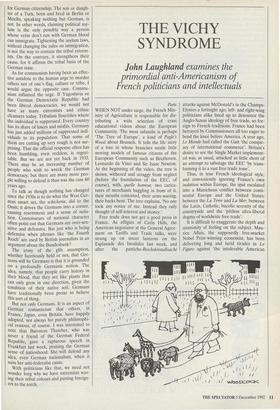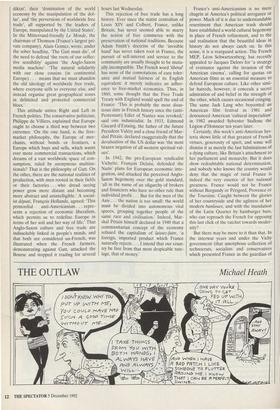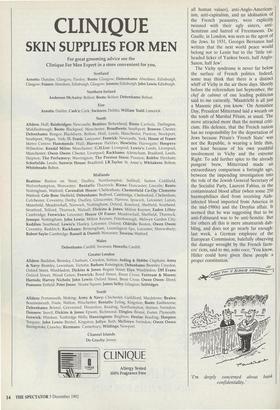THE VICHY SYNDROME
John Laughland examines the
primordial anti-Americanism of French politicians and intellectuals
Paris WHEN NOT under siege, the French Min- istry of Agriculture is responsible for dis- tributing a wide selection of crass educational videos about the European Community. The most infantile is perhaps 'The Tree of Europe', a kind of Pogle's Wood about Brussels. It tells the life story of a tree in whose branches nestle little moving models of famous citizens of the European Community such as Beethoven, Leonardo da Vinci and Sir Isaac Newton. At the beginning of the video, the tree is shown, withered and scraggy from neglect (before the foundation of the EEC, of course), with, quelle horreur, two carica- tures of merchants haggling in front of it, their mouths contorted, their arms waving, their backs bent. The tree explains, 'No one took any notice of me. Instead they only thought of self-interest and money.'
Free trade does not get a good press in France. As effigies of Carla Hills, the American negotiator at the General Agree- ment on Tariffs and Trade talks, were strung up on street lanterns on the Esplanade des Invalides last week, and after the pastiche-Reichskristallnacht attacks against McDonald's in the Champs- Elysées a fortnight ago, left- and right-wing politicians alike lined up to denounce the Anglo-Saxon ideology of free trade, so for- eign to French traditions. France had been betrayed by Commissioners all too eager to bend the knee before America. A year ago, Le Monde had called the Gatt 'the conspir- acy of international commerce'. Britain's desire to see the Single Market implement- ed was, as usual, attacked as little short of an attempt to sabotage the EEC 'by trans- forming it to a vast free trade zone'.
Thus, in true French ideological style, and conveniently ignoring France's own isolation within Europe, the spat escalated into a Manichean conflict between conti- nental Europe and the United States; between the La Terre and La Mer, between the Latin, Catholic, bucolic serenity of the countryside and the 'pitiless ultra-liberal dogma of worldwide free trade'.
It is difficult to exaggerate the depth and unanimity of feeling on the subject. Mau- rice Allais, the supposedly free-market Nobel Prize-winning economist, has been delivering long and lurid tirades in Le Figaro against 'the intolerable American diktat', their 'domination of the world economy by the manipulation of the dol- lar', and 'the perversions of worldwide free trade', all supported by 'the leaders of Europe, manipulated by the United States'. In the Mitterrand-friendly Le Monde, the chairman of Thomson (France's largest pri- vate company), Alain Gomez, wrote, under the sober headline, 'The Gatt must die', of the need to defend 'the roots of our collec- tive sensibility' against 'the Anglo-Saxon media machine'. 'The natural solidarity with our close cousins (in continental Europe) . . . means that we must abandon the old ideology of worldwide free trade, where everyone sells to everyone else, and instead organise great geographical zones in delimited and protected commercial blocs.'
This attitude unites Right and Left in French politics. The conservative politician, Philippe de Villiers, explained that Europe ought to choose a third way between two extremes: 'On the one hand, is the free- market philosophy, the Europe of mer- chants, without bonds or frontiers, a Europe which buys and sells, which wants ever more commercial transactions, which dreams of a vast worldwide space of con- sumption, ruled by anonymous multina- tionals? That is the philosophy of Gatt. On the other, there are the national realities of production, with men rooted in their fields or their factories. .. who dread seeing power grow more distant and becoming more abstract and unintelligible.' A social- ist depute, Francois Hollande, agreed: 'This primordial anti-Americanism . .. repre- sents a rejection of economic liberalism, which permits us to redefine Europe in terms of her soil and her way of life.' That Anglo-Saxon culture and free trade are indissolubly linked in people's minds, and that both are considered un-French, was illustrated when the French farmers, demonstrating against Gatt, attacked the Bourse and stopped it trading for several
hours last Wednesday.
This rejection of free trade has a long history. Ever since the statist centralism of Louis XIV and Colbert, France, unlike Britain, has never seemed able to marry the notion of free commerce with the preservation of national traditions. Because Adam Smith's doctrine of the 'invisible hand' has never taken root in France, the pursuit of self-interest and service to the community are usually thought to be mutu- ally incompatible. The French word 'liberal' has none of the connotations of easy toler- ance and mutual fairness of its English equivalent: it merely indicates an adher- ence to free-market economics. Thus, in 1860, some thought that the Free Trade Treaty with England would spell the end of France: 'This is probably the most disas- trous date in French history since the (anti- Protestant) Edict of Nantes was revoked,' said one industrialist. In 1933, Edmond Giscard d'Estaing, the father of the future President Valery and a close friend of Mar- shal Petain, declared exaggeratedly that the devaluation of the US dollar was 'the most brazen negation of all western spiritual val- ues'.
In 1942, the pro-European syndicalist Vichyite, Francois Delaisi, defended the Nazis' plans for European economic inte- gration, and attacked the perceived Anglo- Saxon hegemony over the gold standard, 'all in the name of an oligarchy of brokers and financiers who have no other rule than individual profit .. . But for the men of the Axis ... the nation is too small: the world must be divided into autonomous vital spaces, grouping together people of the same race and civilisation.' Indeed, Mar- shal Main himself declared in 1940 that a communitarian concept of the economy refused the capitalism of laissez-faire, 'a foreign, imported product which France naturally rejects. . . I intend that our coun- try be free from that most despicable tute- lage, that of money.'
France's anti-Americanism is no mere chagrin at America's political arrogance or power. Much of it is due to understandable resentment that American trash should have established a world cultural hegemony in place of French refinement, and to the sad realisation that the beautiful ideas in history do not always catch on. In this sense, it is a rearguard action. The French MEP, Leon Schwartzenberg, has recently appealed to Jacques Delors for 'a strategy of resistance against the invasion of the American cinema', calling for quotas on American films as an essential measure to defend European culture. Like other simi- lar hatreds, however, it conceals a secret admiration of and belief in the strength of the other, which causes occasional cringing. The same Jack Lang who boycotted an American film festival in 1981 and denounced American 'cultural imperialism' in 1982 awarded Sylvester Stallone the Legion d'Honneur ten years later.
Certainly, this week's anti-American hys- teria shows little of that greatest of French virtues, generosity of spirit, and some will dismiss it as merely the last fulminations of a dying culture, like Britain's attachment to her parliament and monarchy. But it does show redoubtable national determination, and nobody who knows the country would deny that the magic of rural France is indeed the very essence of her national greatness. France would not be France without Burgundy or Perigord, Provence or the Touraine. Caught between the glories of her countryside and the ugliness of her modern banlieues, and with the inundation of the Latin Quarter by hamburger bars, who can reproach the French for opposing this last click of the ratchet towards moder- nity?
But there may be more to it than that. In the interwar years and under the Vichy government (that amorphous collection of technocrats, socialists and conservatives which presented France as the guardian of all human values), anti-Anglo-American- ism, anti-capitalism, and an idolisation of the French peasantry, were explicitly twinned with their ugly sisters, anti- Semitism and hatred of Freemasons. De Gaulle, in London, was seen as the agent of the Jews. In 1931, Georges Bemanos had written that the next world peace would belong not to Lenin but to the 'little rat- headed licker of Yankee boots, half Anglo- Saxon, half Jew'.
The Vichy syndrome is never far below the surface of French politics. Indeed, some may think that there is a distinct whiff of Vichy in the air these days. Shortly before the referendum last September, the chef de cabinet of one leading politician said to me earnestly, 'Maastricht is all just a Masonic plot, you know.' On Armistice Day, President Mitterrand laid a wreath on the tomb of Marshal Petain, as usual. The move attracted more than the normal criti- cism. His defence, that the French nation has no responsibility for the deportation of Jews because Petain's 'French State' was not the Republic, is wearing a little thin, not least because of his own youthful involvement in Vichy and the extreme Right. To add further spice to the already pungent brew, Mitterrand made an extraordinary comparison a fortnight ago, between the impending investigation into the role of the Jewish General Secretary of the Socialist Party, Laurent Fabius, in the contaminated blood affair (when some 250 haemophiliacs died from receiving Aids- infected blood imported from America in the mid-1980s) and the Dreyfus affair. It seemed that he was suggesting that to be anti-Fabiusard was to be anti-Semitic. But for others all this is mere amateurish dab- bling, and does not go nearly far enough: last week, a German employee of the European Commission, balefully observing the damage wrought by the French farm- ers' riots, said to me, sotto voce, 'You know, Hitler could have given these people a proper constitution.'
'I'm deeply concerned about bank confidentiality.'












































































 Previous page
Previous page